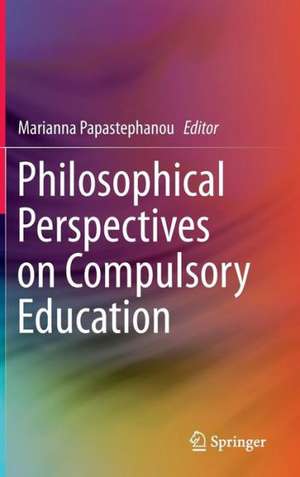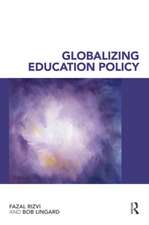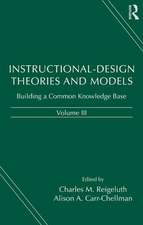Philosophical Perspectives on Compulsory Education
Editat de Marianna Papastephanouen Limba Engleză Hardback – 20 sep 2013
| Toate formatele și edițiile | Preț | Express |
|---|---|---|
| Paperback (1) | 635.80 lei 6-8 săpt. | |
| SPRINGER NETHERLANDS – 27 aug 2016 | 635.80 lei 6-8 săpt. | |
| Hardback (1) | 642.03 lei 6-8 săpt. | |
| SPRINGER NETHERLANDS – 20 sep 2013 | 642.03 lei 6-8 săpt. |
Preț: 642.03 lei
Preț vechi: 755.33 lei
-15% Nou
Puncte Express: 963
Preț estimativ în valută:
122.85€ • 133.87$ • 103.52£
122.85€ • 133.87$ • 103.52£
Carte tipărită la comandă
Livrare economică 23 aprilie-07 mai
Preluare comenzi: 021 569.72.76
Specificații
ISBN-13: 9789400773103
ISBN-10: 9400773102
Pagini: 200
Ilustrații: XII, 191 p. 7 illus.
Dimensiuni: 155 x 235 x 20 mm
Greutate: 0.46 kg
Ediția:2014
Editura: SPRINGER NETHERLANDS
Colecția Springer
Locul publicării:Dordrecht, Netherlands
ISBN-10: 9400773102
Pagini: 200
Ilustrații: XII, 191 p. 7 illus.
Dimensiuni: 155 x 235 x 20 mm
Greutate: 0.46 kg
Ediția:2014
Editura: SPRINGER NETHERLANDS
Colecția Springer
Locul publicării:Dordrecht, Netherlands
Public țintă
ResearchCuprins
Acknowledgements.- Editor’s Introduction.- Part One: The General, Theoretical Challenges.- Chapter One: Volker Kraft, ‘Constants of Education’.- Chapter Two: Robin Barrow, ‘Compulsory Common Schooling and Individual Difference’.- Chapter Three: Geoffrey Hinchliffe, ‘Education, Liberty and Authority: justifying compulsory education’.- Chapter Four: Kevin Williams, ‘Compulsion and Education as a Conversation: Are they compatible?’.- Chapter Five: Naoko Saito, ‘Compulsion without Coercion: liberal education through uncommon schooling’.- Chapter Six: Anders Schinkel, ‘On the justification of compulsory schooling’.- Part Two: The Many Faces of Challenges Confronting the Compulsory.- Chapter Seven: David Blacker, ‘Compulsory Education Cycles Down’.- Chapter Eight: Roni Aviram, ‘Is there hope for modern education systems in postmodern democracies?’.- Chapter Nine: Kevin Williams, ‘Conscripts or volunteers? The status of learners in faith schools’.- Chapter Ten: Helen Lees, ‘Is the idea ofcompulsory schooling ridiculous?’.- Chapter Eleven: Andrew Davis, ‘Homework: chronicles of wasted time?’.- Chapter Twelve: Amrita Zahir, ‘Understanding Transformation’.- Coda: Paul Gibbs, ‘Happiness and Education: Recognizing a fundamental attunement’.
Notă biografică
Marianna Papastephanou has studied and taught at the University of Cardiff, UK. She has also studied and researched in Berlin, Germany. She is currently teaching Philosophy of Education in the Department of Education at the University of Cyprus. Her research interests include political philosophy, the 'modern vs postmodern' divide, utopia, the Frankfurt School and epistemological, linguistic and ethical issues in education. She has written articles on the above topics, she is the editor of K-O Apel: From a Transcendental-Semiotic Point of View (Manchester: MUP, 1997), and the author of: Educated Fear and Educated Hope (Rotterdam, Sense Publishers, 2009); and Eccentric Cosmopolitanism and a Globalized World (Boulder, Paradigm, 2012).
Textul de pe ultima copertă
Contributions to this volume from diverse perspectives explore pedagogical practices of the contemporary world, namely the school. Themes of autonomy, authority and liberalism are surfaced in the debates and highly innovative insights presented in this book where philosophical perspectives shed light on the theoretical underpinnings of formal education and schooling. How we interpret the self, humanity and the world connects to perspectives on compulsory education.
General theoretical issues surrounding compulsory education are often tested through more concrete aspects of schooling, some of which have a specific origin in, or particular bearing on, the current socio-political conditions of schooling. For this reason, this book is sensitive to context and to empirical and concrete dimensions of the educational venture, and takes into account current concerns about neo-liberal policies and their effects on schooling.
As a philosophical-educational intervention in the topic ofcompulsory education, these chapters draw connections between older philosophical debates on compulsoriness and new developments and emphases in schooling.
General theoretical issues surrounding compulsory education are often tested through more concrete aspects of schooling, some of which have a specific origin in, or particular bearing on, the current socio-political conditions of schooling. For this reason, this book is sensitive to context and to empirical and concrete dimensions of the educational venture, and takes into account current concerns about neo-liberal policies and their effects on schooling.
As a philosophical-educational intervention in the topic ofcompulsory education, these chapters draw connections between older philosophical debates on compulsoriness and new developments and emphases in schooling.
Caracteristici
Addresses the lack of philosophical-educational engagement with one of the most central pedagogical practices of the contemporary world Recasts the debate about compulsory schooling in the light of current philosophical educational debates Opens valuable, new paths in the relevant educational discourse Includes supplementary material: sn.pub/extras













